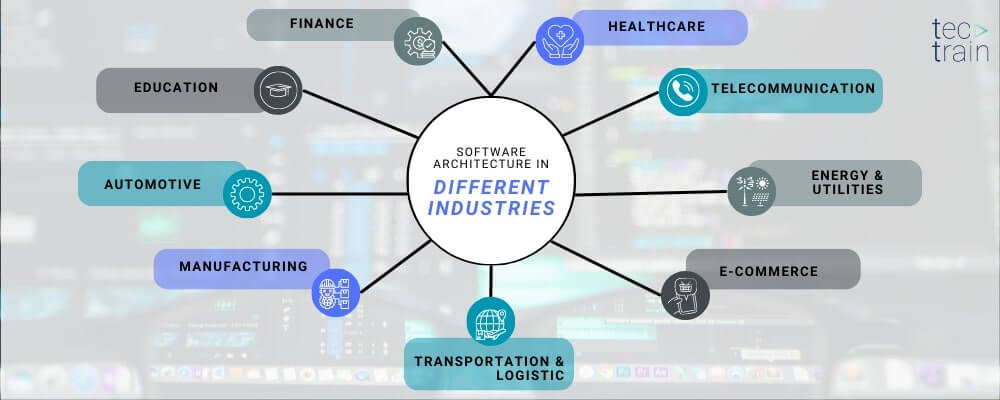Software Architecture's Role in Industries and Applications
In various industries like healthcare, finance, e-commerce, and more, software architecture plays an important role as the creative force shaping the digital landscape.
This article aims to shed light on the significant impact of software architecture in practice within these domains and illustrate how it facilitates seamless process execution.
Explore the indispensable role of software architects in ensuring precision, security, and efficiency in software solutions. Delve into the fascinating real-world applications of software architecture and uncover the abundant opportunities for self-improvement in this burgeoning field.
Immerse yourself in the realm of software architecture to witness firsthand how it fuels innovation and drives progress in the digital world.

The Invisible Architects of the Digital World
When we think of architects, we usually envision people designing and constructing buildings.
However, there is another kind of architect operating in the digital realm – software architects. These invisible architects play a crucial role in various industries such as healthcare, finance, e-commerce, and many more. They design the structure and framework of software solutions to ensure they are robust, scalable, and efficient.
Featured Resource
What does a software architect do?
The Role of Software Architecture in Healthcare
In healthcare, software architecture is of paramount importance to facilitate seamless communication and smooth data exchange between different medical systems. Good software architecture is crucial for accurate, secure, and accessible medical information, including electronic health records, imaging systems, and medical devices.
A solid software architecture enables efficient and secure management of electronic health records. By structuring databases correctly and implementing appropriate interfaces, medical personnel can quickly and easily access relevant information, whether for diagnosis, treatment planning, or monitoring patient progress.

Furthermore, well-designed software architecture enables the coherence of medical systems, allowing seamless information exchange between different departments and facilities.
Another crucial aspect of healthcare is the security of medical information. Through robust software architecture, robust security mechanisms can be implemented to protect access to sensitive data. To protect medical information, a good software design should include encryption, access controls, and audit trail functions. These measures help maintain confidentiality and integrity.
In addition to accuracy and security, the availability of medical information also plays a crucial role. Particularly in emergencies, it is important that medical personnel can immediately access relevant data to make rapid decisions and take appropriate actions. A robust software architecture designed for high availability ensures that medical systems are accessible and functioning smoothly around the clock.
The ongoing digitalization in healthcare also opens up new possibilities for the use of medical devices and imaging systems. Well-thought-out software architecture enables the integration of these devices into the overall system and ensures seamless communication between them. This contributes to improving efficiency in diagnosis and treatment and increasing patient safety.
Software Architecture in Finance
Building a solid foundation In finance, trust is key. Customers rely on their financial transactions being handled securely and reliably. This is where software architecture comes into play and assumes a crucial role in creating a robust platform for dealing with sensitive financial data.
In the finance industry, the role of a software architect is vital in ensuring the secure and efficient handling of sensitive financial data. They design and develop software systems and platforms that support various financial services, such as online banking applications, trading systems, and payment processing platforms.

Software architects in finance focus on creating a robust and scalable software architecture that enables quick and accurate transaction processing while maintaining the highest levels of security. They implement encryption mechanisms, access controls, and security protocols to protect sensitive financial information and ensure compliance with industry regulations.
Additionally, software architects in finance collaborate with stakeholders to understand business requirements and translate them into technical designs. They are responsible for ensuring the reliability, performance, and availability of financial software systems, even during high-demand periods. Their role involves considering factors such as data integrity, system integration, and integration with external systems or services.
Finance software architects use their skills in software design and architecture to create trustworthy and efficient software for financial institutions. This software ensures secure handling of financial transactions and data, building confidence in the industry.
E-commerce: Software Architecture Powers Online Shopping
In the e-commerce industry, software architects play a crucial role in creating the complex infrastructure that supports online shopping platforms. Their expertise in application layer software architecture and technology of large-scale systems allows them to design well-structured software systems.
This ensures smooth connections between different processes like order management, inventory control, and payment processing, leading to enhanced efficiency and seamlessness in the shopping experience for customers.
For e-commerce websites, especially during busy periods like sales events or holidays, software architects focus on building systems that can handle high volumes of customers and transactions. Their adept design of software architectures ensures that websites run smoothly and perform well, effortlessly meeting heightened demands without disruptions or slowdowns.
Security is a top priority in e-commerce, and software architects implement robust measures to protect customer data and maintain transaction integrity. They use cutting-edge encryption, secure payment gateways, and stringent access controls to foster trust among customers, enhancing the credibility of online platforms.

To stay ahead in the rapidly evolving digital landscape, software architects continually update their knowledge and skills in emerging technologies and industry best practices. Their expertise spans areas like mobile commerce, omnichannel integration, and personalized user experiences. By integrating these advancements into the architecture of large-scale systems, e-commerce platforms can remain competitive and relevant.
In conclusion, software architects are indispensable in the e-commerce industry, with their application layer software architecture expertise and knowledge of technology in large-scale systems. Through their skillful practice of software architecture, they ensure seamless processes, scalability, and robust security, ultimately elevating the customer experience and empowering e-commerce platforms to thrive in a dynamic market.
Other Industries, Further Opportunities
The role of software architecture is not limited to healthcare, finance, and e-commerce alone. Thoughtful architecture is crucial in virtually every industry that employs software solutions. Whether in the automotive industry, education sector, or entertainment industry, software architects are the unsung heroes shaping the digital landscape.
Software architecture is relevant and applicable across a wide range of industries. Here are a few examples of industries where software architecture plays a significant role:
- Manufacturing: In the manufacturing industry, software architecture is crucial for managing production processes, supply chain management, and optimizing resource utilization. Architects design software systems that enable efficient production planning, inventory control, and real-time monitoring of manufacturing operations.
- Transportation and Logistics: In the transportation and logistics industry, software architecture is essential for managing complex operations such as fleet management, route optimization, and shipment tracking. Architects design software systems that facilitate efficient logistics planning, enhance supply chain visibility, and improve overall operational efficiency.
- Telecommunications: The telecommunications industry relies heavily on software architecture to support telecommunications networks, billing systems, and customer management platforms. Architects design software solutions that ensure reliable communication, efficient network management, and seamless integration of various telecommunication services.
- Energy and Utilities: In the energy and utilities sector, software architecture is crucial. It manages power grids, smart metering systems, and energy distribution networks. Architects design software systems. These systems enable efficient energy monitoring, demand response, and grid management. The aim is to optimize energy consumption and ensure a reliable power supply.
- Automotive: Automotive software architecture plays a crucial role in the industry, especially in the development of advanced driver-assistance systems, connected car platforms, and vehicle control systems.
Architects in this field meticulously design software solutions that enable seamless vehicle connectivity, real-time data processing, and efficient integration of onboard systems. The primary objective is to elevate safety, performance, and the overall user experience for drivers and passengers alike.
By leveraging automotive software architecture, the industry can push the boundaries of innovation and drive the future of smart and interconnected vehicles.

- Education: In the education sector, software architecture is crucial for developing learning management systems, online educational platforms, and virtual classrooms. Architects design software solutions that support e-learning, content management, student engagement, and personalized learning experiences.
Software architecture is used in many industries like retail, entertainment, hospitality, government, and more. Software architects design and develop software systems for different industries to meet their needs, improve efficiency, and encourage innovation.
iSAQB Training at tectrain
Software architecture plays a critical role in various industries, ensuring the development of reliable and scalable software solutions. As businesses across sectors increasingly rely on technology, the need for skilled software architects becomes paramount.
The iSAQB certification shows that someone is skilled in software architecture. Professionals who have this certification have a good understanding of architectural principles, design patterns, and best practices. With an iSAQB certification in hand, individuals can unlock exciting opportunities and make valuable contributions as software architects in diverse industries.
We offer iSAQB training at tectrain. This training is based on the guidelines of the International Software Architecture Qualification Board (iSAQB). It aims to provide comprehensive software architecture education.
Our software architecture courses offer the opportunity to focus on specific industries and tasks. This way, our participants can deepen their knowledge and skills in areas such as healthcare, finance, e-commerce, or other industries. This specialization allows them to develop a deep understanding of the specific requirements and challenges of these industries and design tailored solutions.
Our iSAQB training courses provide an ideal foundation for success as a software architect in various fields. At tectrain, we are ready to assist you in choosing the right training and support you on your path to a successful career as a software architect.
Conclusion
The importance of software architecture in various industries cannot be emphasized enough. It is the invisible backbone that holds digital solutions together and maximizes their performance.
If you want to learn more about the exciting world of software architecture and advance in this field, we recommend exploring the courses offered by tectrain. Tectrain offers training and certifications for software architecture to enhance skills and advance careers.
Embrace the opportunity to become part of the architects of the digital world!








